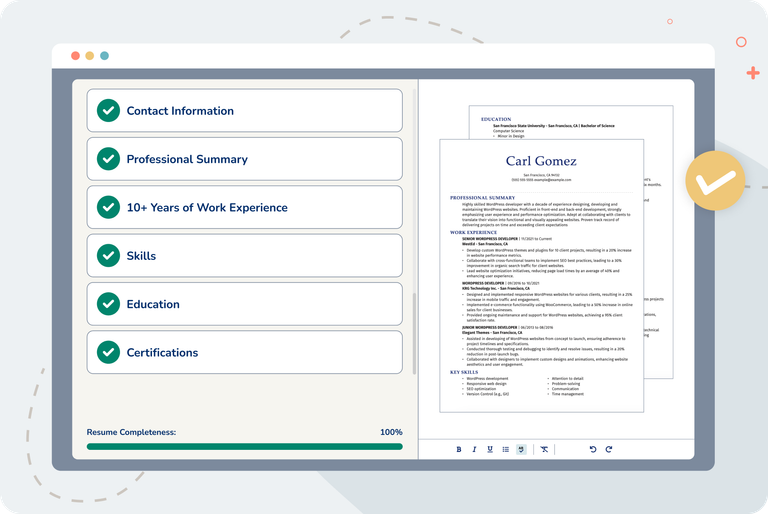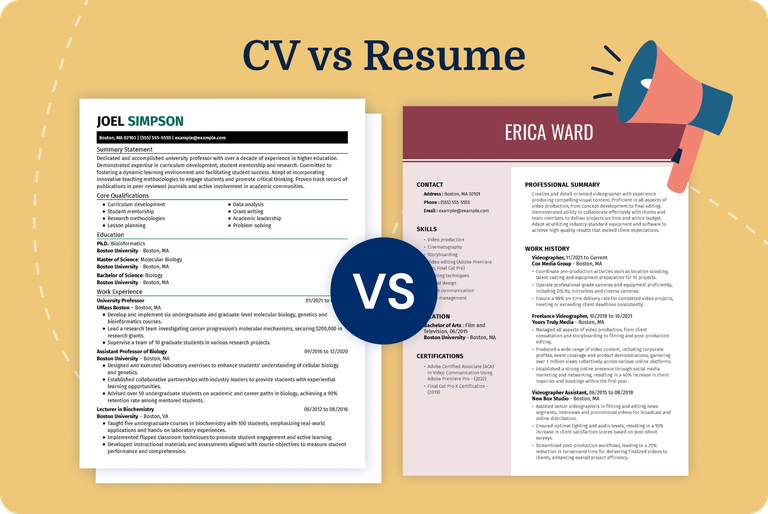Table of Contents
Get started with MyPerfectResume today!
- Build a resume on any device
- Pick an ATS-friendly template
- Tailor with AI copy suggestions
Why this resume works
- Quantifies accomplishments: Measurable accomplishments, such as a 15% crop yield increase and a 20% water usage reduction, showcase the applicant’s impactful strategies in farming.
- Highlights industry-specific skills: Skillfully managing irrigation systems and livestock care, alongside certified expertise, highlights the applicant’s alignment with sustainable agriculture roles.
- Showcases career progression: Progressing from field technician to farmer illustrates the applicant’s expanding responsibilities and capabilities in agricultural management.
More Farmer Resume Examples
Explore our farmer resume examples to see how to showcase your agricultural skills and experience. These farming and agriculture resume samples will help you create a resume that highlights your expertise in farming operations and crop management.
Entry-Level Farmer
Why this resume works
- Effective use of keywords: By incorporating industry-specific keywords like “sustainable agriculture” and “crop planning,” the applicant ensures their resume is optimized for applicant tracking systems (ATS).
- Shows digital literacy: Mentioning farm equipment operation and irrigation systems highlights computer skills and digital readiness, aligning with modern workplace demands.
- Centers on academic background: The education section showcases degrees in crop science and agricultural business, showing foundational knowledge important for career growth early on.
Mid-Level Farmer
Why this resume works
- Points to measurable outcomes: Showcasing accomplishments like increased yield by 15% and reduced pesticide costs by 10%, the applicant effectively illustrates their strategic impact on farm management and cost efficiency.
- Includes a mix of soft and hard skills: Combining technical expertise in crop management with mentoring roles, the applicant’s skill set highlights a balance of interpersonal skills and analytical abilities.
- Demonstrates language abilities: With beginner Spanish and German and intermediate French, the applicant’s language skills indicate their ability to engage in cross-cultural farming initiatives.
Experienced Farmer
Why this resume works
- Showcases impressive accomplishments: Quantifiable results like boosting crop yield by 20% and reducing pesticide use showcase standout accomplishments that reflect the applicant’s eco-conscious strategies and significant industry impact.
- Emphasizes leadership skills: Managing a team of 15 farmhands and leading an organic farm conversion project illustrates strong leadership skills through coordination and innovation in sustainable practices.
- Sections are well-organized: Clear headers, concise bullet points, and logical grouping of sections ensure the resume is reader-friendly, allowing for quick identification of key qualifications.
Farmer Resume Template (Text Version)
Suki Davis
Los Angeles, CA 90021
(555)555-5555
Suki.Davis@example.com
Skills
- Crop Management
- Farm Equipment Operation
- Sustainable Agriculture
- Livestock Care
- Irrigation Systems
- Pest and Weed Control
- Soil Health Analysis
- Harvest Logistics
Languages
- Spanish – Intermediate (B1)
- French – Beginner (A1)
- German – Beginner (A1)
Professional Summary
Experienced Farmer with 4 years in managing crops and livestock, achieving a 15% yield increase. Skilled in sustainable agriculture, irrigation, and soil health. Proven leader in adopting eco-friendly practices and enhancing farm operations.
Work History
Farmer
Harvest Grove Farms – Los Angeles, CA
June 2023 – June 2025
- Managed 200-acre land and increased crop yield by 15%
- Introduced smart irrigation, cutting water usage by 20%
- Oversaw livestock care, reducing mortality rates by 10%
Agricultural Equipment Operator
Pioneer AgroTech – San Francisco, CA
June 2021 – May 2023
- Operated machinery, increasing planting efficiency by 25%
- Reduced downtime by optimizing preventive maintenance schedules
- Transported crops to storage, ensuring 100% on-time delivery
Assistant Agronomist
Fertile Fields Cooperative – Riverside, CA
June 2019 – May 2021
- Conducted soil analysis for 35 farms, improving fertility by 18%
- Supported pest control programs, reducing crop damage by 12%
- Collaborated on crop rotation plans, boosting sustainability
Certifications
- Certified Crop Advisor – American Society of Agronomy
- Sustainable Farming Practices Certification – Sustainable Agriculture Organization
- Advanced Farm Machinery Operation – National Farm Machinery Council
Education
Master of Science Agronomy
Iowa State University Ames, Iowa
May 2019
Bachelor of Science Agricultural Studies
University of Iowa Iowa City, Iowa
May 2017
Related Resume Guides
Advice for Writing Your Farmer Resume
Explore our tips on how to write a resume for a farmer position and learn how to highlight your farming expertise and dedication to sustainable agriculture.
Highlight relevant technical skills
Farming involves a variety of technical skills to effectively manage and cultivate land. These skills are important because they help farmers grow crops, raise animals, and maintain equipment efficiently.
Common technical skills for farmers include crop management, which involves understanding soil health, planting techniques, and pest control methods. Equipment operation is another key skill since farmers often use tractors, plows, and other machinery. Irrigation management is also important to ensure crops receive the right amount of water for optimal growth.
Additionally, knowledge of animal husbandry can be valuable if your farming includes livestock. This means knowing how to care for animals’ health and well-being. Finally, basic repair and maintenance skills are handy when fixing farm tools or machinery that breaks down.
Highlighting these technical skills on your resume can help show that you are ready for the demands of modern farming. When creating your resume, include a dedicated skills section and weave these skills into your work experience descriptions. This approach will show how you have applied these abilities in real-world situations.
Example of a technical skills section
- Crop management and rotation
- Soil analysis and nutrient management
- Irrigation systems (drip, sprinkler)
- Farm machinery operation and maintenance
- Pest control and integrated pest management (IPM)
- Livestock care and breeding techniques
- Greenhouse operations and hydroponics
- Precision agriculture technologies (GPS, drones)
- Organic farming practices
- Supply chain logistics for agricultural products
You can use our AI Resume Builder to craft a job-winning farmer resume that highlights key technical skills and soft skills like teamwork, communication, and leadership.
Quantify your accomplishments
Quantifying accomplishments on a resume makes it more compelling by showing real results rather than just listing what you did. For a farmer, this means turning daily tasks into measurable achievements.
In the work experience section, each entry should start with your job title, employer name, location, and employment dates. Instead of stating “managed crops,” you could say “increased crop yield by 20% through sustainable farming techniques.” This offers hiring managers a clear picture of your impact and skills.
Using action verbs and metrics in your work experience helps create a results-driven resume. For example, instead of saying “handled livestock,” say “improved livestock health scores by 15% over one year.” Such specifics help quickly show your contributions and effectiveness.
Numbers like percentages or time saved make your achievements stand out more clearly to hiring managers. They can immediately see the value you’ve brought to past employers, making it easier for them to imagine you doing the same for them. Quantified accomplishments give life to your role as a farmer and highlight the skills you possess.
5 farmer work history bullet points
- Managed a 200-acre farm, increasing crop yield by 25% through innovative irrigation techniques.
- Implemented soil health management practices, reducing fertilizer costs by 15% annually.
- Led a team of 10 seasonal workers in planting and harvesting operations, improving efficiency by 20%.
- Introduced organic farming methods that boosted produce sales by 30% over two years.
- Developed and maintained relationships with local markets, expanding distribution channels by 40%.
Looking for ideas? Check out these professional resume examples to see layouts and ideas that can help your resume stand out.
Write a powerful professional summary
A professional summary is an introduction on your resume that helps hiring managers quickly understand who you are and what you bring to the table. When writing your resume, you need to decide if you want a summary or a resume objective.
A professional summary is best for experienced applicants like farmers with years of work behind them. It usually includes three or four sentences that show off your experience, skills, and achievements. The main purpose is to showcase your professional identity and the value you can add to a potential employer’s team.
On the other hand, resume objectives are statements about career goals. They’re great for entry-level applicants, career changers, or those with gaps in their work history. While a summary focuses on “what I’ve accomplished,” an objective talks about “what I aim to contribute.”
We’ll provide examples of both summaries and objectives tailored for various industries and levels of experience.
Farmer resume summary examples
Entry-level
Recent agriculture graduate with a Bachelor of Science in agronomy and hands-on experience in crop production and soil management through internships. Skilled in using farm equipment, understanding pest control methods, and maintaining detailed records. Eager to apply knowledge and contribute to sustainable farming practices.
Mid-career
Experienced farmer with over seven years of managing diverse agricultural operations, including crop rotation, livestock care, and organic farming techniques. Proficient in operating modern farm machinery, implementing irrigation systems, and optimizing yield through innovative practices. Known for strong problem-solving skills and effective team collaboration.
Experienced
Veteran farmer specializing in large-scale agricultural management and advanced crop science. Over 20 years of expertise in land cultivation, resource allocation, and sustainable farming solutions. Proven track record of increasing farm productivity while reducing operational costs. Leader in community agricultural initiatives and committed to promoting eco-friendly farming methods.
Farmer resume objective examples
Entry-level
Aspiring farmer with a degree in agricultural science and hands-on experience from internships. Seeking an entry-level farming position to apply knowledge of sustainable farming practices and crop management. Passionate about supporting farm operations while promoting environmental stewardship.
Career changer
Dedicated former office manager transitioning into a farming role, bringing strong organizational skills and a passion for agriculture. Aiming to contribute to farm productivity by applying project management expertise and learning new farming techniques in a collaborative environment.
Recent graduate
Eager recent graduate with a background in horticulture aiming to begin a career in farming. Looking to join an innovative farm where skills in plant cultivation and soil health can be used to support sustainable production and contribute to overall farm success.
Choose a resume template that’s straightforward. Keep sections tidy, use readable fonts, and avoid elaborate designs to help managers quickly spot your skills without hassle.
Showcase your credentials
Listing certifications, licenses, and specialized training is important as a farmer because it shows you have the skills needed to succeed. In technical fields like farming, having the right credentials can set you apart when applying for jobs.
Create a certifications section on your resume to list these achievements. This section can make your education stand out more by showing what you’ve learned beyond school. Here are a few examples:
- Pesticide Applicator License (state-specific)
- Certified Crop Adviser (CCA)
- USDA Organic Certification
- Certified Livestock Manager (CLM)
- Commercial Driver’s License (CDL)
- First Aid/CPR Certification
- Farm Equipment Safety Certification
- Sustainable Agriculture Training Certification
These certifications help show you’re ready for challenges in farming and have expert knowledge. By listing them on your resume, potential employers can see you’re committed to advancing your skills. Having these credentials can give you an edge in getting hired and succeeding as a farmer.
Example of a certifications section
Certified Crop Advisor
Issued by: American Society of Agronomy
Issued 2021
Pesticide Applicator License
Issued by: State Department of Agriculture
Expires 2023
Organic Farming Certification
Issued by: Organic Trade Association (OTA)
Issued 2022
Animal Welfare Approved Certification
Issued by: A Greener World (AGW)
Issued 2019
Farmer’s Market Vendor Certification
Issued by: Local Farmers Market Association
Use a polished and professional resume format that showcases your key skills and qualifications.
Salary Insights for Farmers
Understanding salary trends can help you make informed decisions about your career path. Reliable data on wages and job outlooks can guide your planning and help you prepare for what’s ahead.
Top 10 highest-paying states for farmers
Farmers earn varying salaries across the United States, with a national average of $88,775. The table below highlights the states where farmers command the highest compensation.
Our salary information comes from the U.S. Bureau of Labor Statistics’ Occupational Employment and Wage Statistics survey. This official government data provides the most comprehensive and reliable salary information for writers across all 50 states and the District of Columbia. The figures presented here reflect the May 2025 dataset, which is the most recent available as of this publication.
| State | Average Salary |
|---|---|
| California | $121,310 |
| Washington | $108,260 |
| North Carolina | $104,540 |
| Florida | $103,740 |
| Massachusetts | $102,660 |
| Iowa | $101,540 |
| Illinois | $97,030 |
| Maryland | $96,030 |
| Maine | $94,520 |
| Oregon | $93,220 |
FAQ
Do I need to include a cover letter with my farmer resume?
Including a cover letter with your farmer resume can positively impact potential employers. A cover letter allows you to showcase your passion for agriculture and any specific farming skills, such as expertise in crop management or animal husbandry.
If the farm focuses on organic produce or sustainable practices, you can discuss your experience or interest in those areas to show alignment with their values. Consider using our Cover Letter Generator to craft a personalized letter that complements your resume and boosts your application.
Additionally, reviewing cover letter examples tailored to agricultural roles can offer useful insights and inspire you when writing your own.
How long should a farmer’s resume be?
For a farmer, a one-page resume usually covers key aspects like your practical experience with agricultural practices, crop and livestock management knowledge, and any relevant certifications or training.
If you’ve managed large-scale operations or have extensive specialized skills, a two-page resume might be suitable. Ensure every point is directly related to farming for clarity and focus.
Highlight specific accomplishments, such as yield improvements or successful sustainable practices, to show your impact in the field. For more detailed insights on determining the ideal length, explore our guide on how long a resume should be.
How do you write a farmer resume with no experience?
If you’re new to farming and lack experience, emphasize your transferable skills, passion for agriculture, and any relevant education or hands-on training. Check out these tips to help you create your resume with no experience:
- Emphasize education and training: If you have taken courses in agricultural science or sustainable farming practices, list them prominently. Include workshops or certifications that relate to farming techniques, pest control, or soil management.
- Showcase relevant skills: Skills like physical stamina, problem-solving abilities, and attention to detail are important for farmers. Mention any experiences where you’ve demonstrated these attributes, even if they were in different fields.
- Include volunteer work: If you’ve volunteered at community gardens or participated in agricultural projects, treat those as valuable experiences. Detail the tasks you performed and the knowledge gained through volunteering.
- Highlight your interest in farming: Describe any personal projects like home gardening or composting that show your enthusiasm for agriculture. Explain how these activities prepared you for professional farming.
Consider creating a functional resume format that organizes your skills and experiences effectively while minimizing the emphasis on traditional work history.
Rate this article
Farmer
Share this page
Additional Resources

The Illusion of Wage Growth: Where Paychecks Stretch the Farthest
U.S. wages have climbed at one of the fastest rates in modern history. Between 2020 and 2024, the average American worker’s pay rose from about $64,000 to $75,600, an 18%

100+ Resume Objective Statement Examples & Best Practices
In just a sentence or two, a resume objective statement tells hiring managers the role or career path you’re aiming for and the unique skills and value you bring to

150+ Skills for a Resume: Examples for Any Job
Crafting a standout resume starts with highlighting the skills and qualifications that demonstrate your fit for the role. But in a crowded job market, knowing which abilities will actually catch

When to Use a Two Page Resume (With Examples & Formatting Tips)
If you’ve spent years building your skills, growing in your career, and racking up accomplishments, a one-page resume might not cut it. A two-page resume gives you space to present a

How to Make an ATS Friendly Resume (Templates & Guide)
In today’s fast-paced hiring climate, many employers use applicant tracking systems (ATS) to organize, store, and screen candidate information. Optimizing your resume for ATS is essential for ensuring your application passes

CV vs Resume: What’s The Difference?
Confused about the difference between a resume and a CV? You’re not alone! While both documents help you land a job, they vary in content, structure, and formatting. In this guide, we’ll
